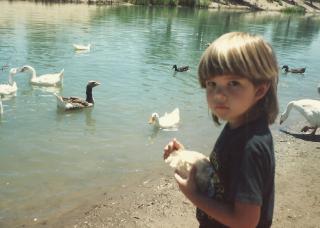
Robyn Coburn wrote:
Intentions matter. Guidance offered from the place of partnership and trust has a different feeling, avoids rebellion, and is just plain less focused on the trivial. Guidance means optional acceptance instead of mandatory compliance. Guidance means parents being safety nets, not trap doors or examiners. Guidance facilitates mindfulness. Directives shut it down, and may even foster resentment instead.
The idea of Unschooling is for parents to be the facilitators of options, the openers of doors, the creators of environments of freedom, and the guardians of choice, not the installers of roadblocks and barriers. Unschoolers are making the huge and wonderful choice to renounce our legal entitlements to be the authoritarian controllers of our children's lives, and instead choose to be their partners.
—Robyn Coburn
SandraDodd.com/choicerobyn
photo by Sandra Dodd, of a long-ago Kirby






